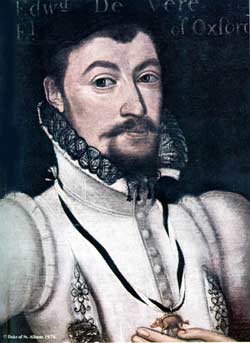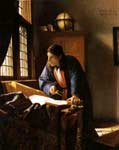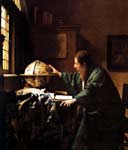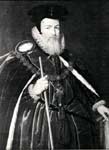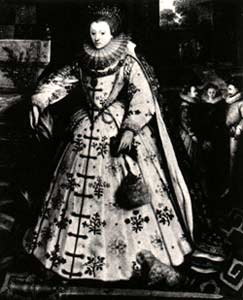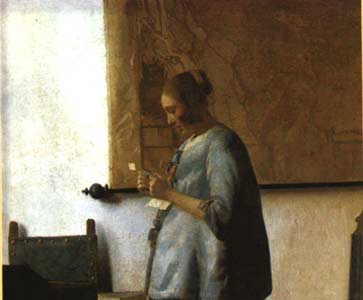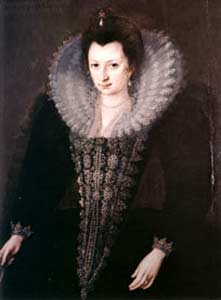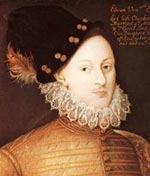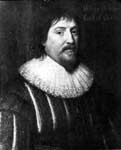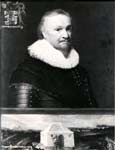Click here to choose to play Music Selections from
"An Evening of Elizabethan Music" by The Julian Bream Consort
RCA Victor LP 2656 (c. 1965)
(music takes 30-60 seconds to load)
[The works of Shakespeare are] conceiv'd out of the fullest heat and pulse of European feudalism — personifying in unparalleled ways the medieval aristocracy, its towering spirit of ruthless and gigantic caste, with its own peculiar air and arrogance (no mere imitation) — only one of the "wolfish earls" so plenteous in the plays themselves, or some born descendant and knower, might seem to be the true author of those amazing works — works in some respects greater than anything else in recorded literature. Walt Whitman Gulielmus Shakspere had an important role to play in what became the legend of Shakespeare. However he was not the author by time, training, talent, inclination, or experience. It is obvious who was, a person born in mid-16th Century England with certain specific knowledge of court and Crown, underlings, laws, land, war, maritime battle and exploration, aristocratic sport, dance, music, jousting, the classics of Greece and Rome, Nature, flowers and gardens, astronomy, medicine, and philosophy, with particular geographic memory of Scotland, Sicily, Mantua, Milan, Siena, Padua, Venice, and the Adriatic, who also possessed the most profound powers of expression in the language. A Renaissance Man wrote "Shakespeare".
SECTION I Born into the oldest most prestigious line in England, the House of Oxford, Edward De Vere was a prodigy and manifested very early as a writer and thinker. He had the greatest tutors of the time. Laurence Nowell was an eminent geographer in the golden age of exploration. John Dee, the famous astronomer was De Vere's friend who inspired the character Glendower in Henry IV, part 2.
Thomas Smith was England's pre-eminent mind in medicine, law, and government. De Vere's uncle, Arthur Golding, whose 'Metamorphoses' of Ovid is still in print, praised by Ezra Pound as "the most beautiful book in the language", wrote and published that book while instructing his teen-aged nephew in tenth year Latin. They were both fluent. References and direct quotations from Golding appear 200 times in "Shakespeare". The Protestant Nowell appears in 'Romeo and Juliet' as Friar Laurence. (Mark Anderson, 'Shakespeare By Another Name', p. 375) Their prodigy went to Cambridge at age eight. After college he got a doctorate in law. He was a member of Elizabeth I's council at twenty. He became articulate also in Greek, French, Italian, and Spanish. Moreover, like his father Earl John he loved Nature and hunting, and at twenty bested the nobility at swords and jousting, then repeated the feat at thirty. It was said of him, he was descended from the goddess of Statecraft and the Arts Pallas Athena who sprang fully grown from the head of Zeus, shaking a spear. De Vere's mother was highly literate but had no influence on his education after he was twelve. His Aunt Frances' husband Henry Howard* first used blank verse in English and, with Thomas Wyatt, the poetic form that became known through De Vere, under his pseudonym, as the Shakespearean Sonnet. This briefest biography shows he had the position, background, education, genius, and even nickname to be considered as the literary giant of his age, "Shakespeare".
Earl John De Vere had kept a play company at his Castle Hedingham. When Edward De Vere was ten, in 1560, the starring clown of the company Will Somers died. He was commemorated in 'Hamlet' twenty-three years later in 1583 by Hamlet's reference, "you in the earth three and twenty years"–mourning Yorick: "He hath bore me on his back a thousand times; and now, how abhorred in my imagination it is!...Where be your gibes now? your gambols? your songs? your flashes of merriment, that were wont to set the table on a roar?" It must have been the first crack of doom to the child. Two years later his father suddenly died, possibly poisoned by a rival, the Earl of Leicester. The suspected murderer took over the Oxford lands and De Vere was placed in ward to the Crown, under the power of William Cecil, the Secretary of Treasury. As part of the disposition, Leicester's second in command married Margery, Earl John's widow, indecently soon thereafter. In Hamlet's word's: "That it should come to this! But two months dead! nay, not so much, not two." This is the entire beginning sequence of 'Hamlet' duplicated from life, except that the murderer and marrier are compressed into a single vile figure named Claudius, the name taken from foul annals of Rome. By twelve De Vere had experienced the human condition. Life is brief and the gods do not interfere. He steadfastly went into ward, and though abandoned by his mother, thrived there. She died six years later. The theme of abandonment, of exile, permeated his life and work. As he would revenge his hurt on his wife, so his heroes were always of two minds about their women. From 'All's Well That Ends Well', the play factually closest to De Vere's youth:
At Cecil's estates, [Posthumus/De Vere]
Anyone who survives abandonment is entitled to consider himself a human being. He survived emotionally because Thomas Smith and his wife Philippa became like godparents. His Aunt Frances, Howard's widow, also was dear. His Uncle Arthur Golding became both teacher and father figure; that is clear from the plays:
Like those who have suffered incomprehensible injustice at an early age, igniting angry sorrow that will not cool in one lifetime, he wanted revenge, plenty of it; this would manifest in his wild nature and in the plays. He concealed and modulated his moods as a means of psychic balance. In an early poem, he said, "Thus contraries be used I find/ Of wise, to cloak the covert mind". At the end of his life, in Othello he described this as "I am not merry but I do beguile the thing I am by seeming otherwise." (Othello II, 1) He portrayed his public behavior at court as: "A man replete with mocks, full of comparisons and wounding flouts which on all states [he] will execute". (AYLI: II, 1) He used his moods to advantage: "Covering discretion with a cloak of folly "(Henry IV,2: II, 4); "[The Prince] hath obscured his contemplation under a veil of wildness"(Henry V: I, 1); "Thou art not what thou seems't" (Henry:IV,1:V, 4). The last quotation repeats the wording of an early poem:
De Vere throughout his life sought another kind of revenge, against the thieving pack warring to rule England, who had taken his lineage's 300 castles and lands and left his family dishonored. In the body of his work, many central characters resemble his own offended nature: Brutus (Rape Of Lucrece); Prince Hal (Henry V); Edmund [n.b.] (King Lear); Jacques (As You Like It); Benedick (Much Ado About Nothing); and Faulconbridge (King John). In the quoted poem he concludes: "I smile to see me scorned so/ You weep for joy to see me woe". De Vere identified with both the past and past figures, perhaps in search of lost time before his orphanhood, but also because his imagination transcended time. His uncle Golding admonished him that princes do not so immerse themselves in history. De Vere was the rare prince who reached across history and art to understand himself. Ovid's' 'Metamorphoses' in Golding's translation so resembled De Vere's language and is so much a young man's book, we are entitled to wonder if Golding and De Vere mutually translated it. Golding wrote thirty books, all of them dry religious and historical tracts. The sensuous verses of Ovid were unlike all of them. Compare the verse in the Golding translation and in Sonnet 64:
Except for jettisoning the 14-syllable line, De Vere expressed virtually the same image thirty five years apart. Golding helped De Vere in another way. He had access to the ancestral library. From Prospero in 'The Tempest': "Knowing I loved my books, he furnished me from mine own library with volumes that I prize above my dukedom" (The Tempest: I, 3) Among the woes that made De Vere an adult in the midst of his childhood were Cecil's plans to marry him off to his young daughter in order to advance his own family's inferior status. Anne was six when Edward De Vere became her father's ward. They married when she was fifteen. There are indications in Cymbeline that Anne [Imogen] felt the same vulgar interference as he: [Speaking to her father] : "It is your fault I love Posthumus; you bred him as my playfellow." (Cymbeline, I, 2) J. Thomas Looney (Loh' Nee), author of the ground-breaking 'Shakespeare Identified' (1920), believed that Anne Cecil was the model for Juliet. However De Vere wrote the narrative 'Romeus and Juliet' when he was twelve and Anne six. His first heroine, of 'Romeus and Juliet', is based on someone else. De Vere had been promised to a maiden of royal blood, which would have made their male heir an ascendant King. This fiancee was lovely Mary Hastings, two years younger than De Vere. She was the one who got away. The indenture for marriage failed when Earl John died. She never married. De Vere gave her immortal respect again, as spirited Maria in 'Love's Labors Lost'. Juliet resembles child-like Anne Cecil in the later play, 'Romeo and Juliet'. Here is a typical stylistic evolution between the younger and grown De Vere:
I think it is significant when comparing these early works to note 'Romeus and Juliet' and the 'Metamorphoses' of Ovid, both narrative in style, have identical 14-syllable lines. The settings of the Romeo/-us works and the last quoted piece are the same Italian city. Finally, we have these nearly identical passages. Although there was an Arthur Brooke, who died in passage to Le Havre in 1563, the author of the early Romeo romance–also given as Arthur Brooke–must have been De Vere. He needed a pseudonym to publish his first creation. Rother, the genus for oxen, + brook meaning ford=ox-ford. The pun between Arthur and author is another subtext. The elder Brooke went to college with him and was not known to have been a writer. The name confusion served De Vere's pseudonymous purpose. When the other Brooke died at sea, George Turberville wrote his elegy. George Turberville had been a disciple of De Vere's poet-uncle, Henry Howard. He both honored the drowned youth and protected young De Vere's pen-name. De Vere served his apprenticeship as a writer in these years. 15,000 rhymed couplets were his Yale College and his Harvard.
By twenty De Vere, having won the royal tournament joust, became the Knight of England and at the same time one of the country's most honored men of letters. The Literari considered him the outstanding poet. He sponsored Bartholomew Clerke's translation of 'The Courtier' by Baldezar Castiglione, the most important secular book of his life. Twenty-eight to thirty-three books were dedicated to him. He supported writers until it bankrupted him and single-handedly sponsored the English Renaissance. His introduction to 'The Courtier' is a time capsule of late-feudal warmth, grace, and chivalry. The book represented the possibility of and guide to perfecting one's character through skill and devotion to knowledge, an objective De Vere sought throughout his life. He was remarkably successful. For instance John Farmer the composer said that De Vere exceeded even professional musicians. He composed songs still sung that were incorporated into the plays. Musical rhythm, harmony, assonance, and the connections between opposites underly the compelling power of his lyric thought. The songs in the plays are integral to their mood and texture. They formed a rudimentary opera, morality plays detached from the church. Expressing a theme prophetic to his own career, he encouraged Thomas Bedingfield, translator of 'Cardanus Comforte', that he would murder his own substance and honor if he did not publish his efforts. He referenced in a poem, Virgil's poem about the honeybee providing for more than self, the implication being that in Nature the bee does not gain from her labors but shares, and the lazy drone eats from the produce. De Vere was struggling to find terms by which he could justify writing as a noble, express the glory of God through the works of man, and still maintain caste honor. The expressive urge set him apart from his peers. In England's class structure, only the lower orders worked and made money. Many nobles wrote as dillitantes. He felt a stronger drive, the universal calling of the philosopher-artist. At the same time De Vere sought to be a hero-commander, like his cousins Francis and Horace De Vere, later lionized as Francisco and Horatio in 'Hamlet'. He did serve in the border region in 1570 during the Scottish uprising, which explains his astounding familiarity with the micro-climates of Scotland mentioned in 'Macbeth'. De Vere emerged as a major rhetorical talent writing a testimony during those months, which Elizabeth circulated among the churches of the realm. It conveys his utter belief in the divine monarch, her kingdom, and the blasphemy by any quarter of opposing her.
He expressed virtually the same monarchism ten years later:
For comparison, let us see what he wrote another ten years later regarding the classes:
Elizabeth the First, seventeen years older than De Vere, to whom he was politically loyal throughout their lives, was not only his monarch and patron, but also his consort in the early l570's. She began an affair and, it has been persuasively argued by Hank Whittemore in 'The Monument', had a child with him, Henry Wriothesley, who was however adopted and raised by Mary Browne and the 2nd Earl of Southampton, then childless after eight years of marriage. He alluded to that tragedy a few years later in 'The Merchant of Venice' where Launcelot says, "The truth will come to light; murder cannot be hid long; a man's son may, but at the length truth will out". ('Merchant of Venice': II, 2) Angry, alienated, confined, De Vere escaped to France, was captured, and finally gained freedom to travel Europe at twenty-five in 1575. From 'All's Well That Ends Well':
De Vere's sixteen-month journey through Europe opened his eyes to the past and to his own possibilities. He knew he would be permanently denied soldier-hero status and kept at court to legitimize Elizabeth's rule. But he could move the soul of England with his pen. Rudolph Steiner said that the years from 25-27 are the fulcrum of a person's life, when he chooses in and of himself how to live. Italy's vital cultural life showed him that class, station, religious orthodoxy could be at least temporarily transcended by imagination. Commedia Dell'Arte for instance broke down class taboos, and its effect is very evident in 'Cymbeline', 'Twelfth Night', 'Love's Labors Lost', 'Comedy of Errors', 'Two Gentlemen of Verona', and especially, 'A Midsummer Night's Dream'. He brought back the Italian Renaissance to England and wherever he traveled challenged Italy to joust with him, the White Knight of England. They laughed and cheered and put on plays lampooning him. He laughed uproarously–with them, at himself. 'Don Quixote' captures his archetypal youth: honor and courage careless of personal consequence. Ironically, Cervantes passed through Palermo a few months after De Vere had set sail. Vladimir Nabokov imagined them meeting, "exchanging a few casual words/ while waiting for fresh horses–and the evening/ was surely blue ..." (1924, Dmitri Nabokov, translator 1988) See Appendix III Showing the full influence of Italy on De Vere's life and work would take a book. I recommend Mark Anderson's 'Shakespeare By Another Name' for a lively survey. Choosing at random from that source, in Italy De Vere saw a play called 'The Moor', a tragedy of fatal jealousy. The play's heroine was called Disdemona. ('Gil Hecatommithi' by Geraldi Cinthio). His later version, 'Othello', became the primary depiction of uncontrollable jealousy in Western literature. Why that theme? While away from England, De Vere had gotten news that his wife was pregnant. But he had not slept with her in eighteen months. He HAD slept with a lady in waiting at the Queen's palace. A conniving servant Rowland Yorke persuaded him he had been cuckolded. Yorke was a Spanish sympathizer attempting to break up the Cecil faction's opposition to that nation by ruining his family, hence the sinister name in the play, Iago, because Spain's patron saint is St. Santiago.
In reality De Vere had been cuckolded–by himself, because Cecil had arranged a switch in De Vere's assignation from the adulteress to his own daughter, De Vere's wife, Anne Cecil. The wife-switch occurs in 'All's Well That Ends Well', 'Measure For Measure', and 'The Rape of Lucrece'. By the time he got to Greece, he was concerned enough to consult the Oracle at Delphi, traditionally the place for questions of paternity. The Oracle declared his wife chaste, innocent, and wronged. To trust his wife was a struggle lasting his whole life. The abandoned soul almost always projects his pain onto an intimate target. Female martyrdom characterizes his entire work. 'Winter's Tale' echos the Delphic prophecy. In De Vere's last play 'The Tempest', Prospero says to Miranda, "Thy mother was a piece of virtue and she said thou wast my daughter." At the end of their lives together he understood her purity and his own irrational vengeance.
To throw out more biographical facts connecting his Italian journey to what he later wrote: On the Rialto is a statue of a hunchback, El Gobbo, revered by Venice's people. De Vere made hunchbacked Gobbo Shylock's faithful servant. At Messina, De Vere met Don John, a Spanish hero-commander. Don John appears in 'Much Ado About Nothing'. During the Genovese civil war Prospero Fattinanti became the new duke. De Vere made Prospero the old duke in 'The Tempest'. On Twelfth Night in Siena, the venerated Piccolomini, playwright and friend to De Vere, directed his own play, 'The Deceived'. The play featured two sets of siblings marrying their opposites after a shipwreck. 'Twelfth Night' adapted the plotline and the occasion De Vere first saw it. Siena's cathedral had a circular mosaic depicting "The Seven Ages of Man". Jacques in 'As You Like It' tells the same story as the mosaic. At Venice's Carnival, high and low acted and danced together in the revels, setting aside identity for the night. This cathartic celebration is echoed in 'Henry V' and 'Antony and Cleopatra'. It suggests that when De Vere returned to London, he passed through the streets in disguise with Elizabeth. Cleopatra was thirty-eight at Actum. Elizabeth was thirty-eight when she seduced De Vere in 1571. There are literally thousands of correspondences between his life and work, leading me to the conclusion that his devotion to truth reached every aspect of his art. William Plumer Fowler has compiled the concordance between the De Vere letters and the Shakespeare literary works. It is just a matter of readers knowing enough to appreciate the facts. At this departure in time, much will be lost, but much uncovered. To finance his lordly trip, De Vere ruined himself financially, another theme of his life. But he felt faith that "The Play" could open the eyes of everyone, high and low: "Invest me in my motley [fool's clothes], give me leave to speak my mind and I will through and through cleanse the foul body of the infected world." ('AYLI': II, 7) However he saw the practical cost of the trip: "A traveler! By my faith, you have great reason to be sad. I fear you leave all your lands to see other men's. Then to have seen much and to have nothing is to have rich eyes and poor hands". ('As You Like It': IV, 1) Let us see what seventeen year old George Chapman, later author of 'Chapman's Homer', thought of a noble he met on the road in Germany during 1575:
SECTION III Returning to England, De Vere quickly produced plays for court and commons. 'The History of Error' (1577), later 'Comedy of Errors' was written first. Then 'Mind and Measure'/ 'Taming of a Shrew' (1576), later 'Taming of the Shrew', produced as a wedding conceit for his sister Mary and the groom Peregrine Bertie, who would figure in the storyline for 'Hamlet' because he traveled to Elsinore Denmark. Their happy marriage would be further advertised in 'Twelfth Night', originally 'A Pleasant Conceit' (1580). 'A Masque of Amazons & Masque of Knights' (1579) became 'Love's Labors Lost'. 'The Jew' or "History of Portio' (1577) became 'Merchant of Venice'. 'Rape of the Second Helen' (1579) became 'All's Well'. 'Cruelties of a Stepmother' (1578) became 'Cymbeline'. 'A Moor's Masque' (1579) was the prototype for 'Othello', the latter never produced in his lifetime. Just this brief list completely explodes the conventional theory about the necessarily late-appearing works of "Shakespeare" so that the Stratford resident didn't have to be reputed to have written plays no youth could. [See Appendix II for a list of early and late versions of the Shakespeare canon.]
The 1580's for De Vere were defined by his affair with Elizabeth's lady in waiting, Anne Vavasour. She had a child, Edward Veer, but not heir to the Oxford title because illegitimate. Instead all went to the Tower and De Vere was banished from the court for years. Only when he warned of a Catholic insurrection did he reconcile with the Queen. His son Edward became the soldier De Vere yearned to be. It was said of him that "he spent all summer in the field and all winter in his study."
De Vere learned his trade as playwright by 1578 and in a short time had transformed English theater. Gabriel Harvey, a scholar of the time, implored him to serve instead in the military realm, the reason being De Vere wrote a plan to train a standing army. He had the vision of a national leader. Harvey's famous statement was, "Thine eyes flash fire. Thy countenance shakes spears." It was not Oxford's fate. He became a kind of political priest through his plays. The transforming rapartee, the sudden surprise, the excited incomprehensible emergencies hooked the audience and kept it until the denouement, a drama laced with what T.S. Eliot called "swarms of inarticulate thought"–this was Shakespearean theater. As with Charles Chaplin when cinema was fresh, the audience could not get enough of the magic dream on the other side of the lime pots. They saw between the lines how their masters lived. Nor could the aristocracy at court get enough, if they could avoid his cutting shafts of wit. As the conflict with Spain became inevitable, Elizabeth capitalized on De Vere's genius, his patriotism, his devotion to her as monarch, finally on his penniless status, and financed the first national myth-making machinery. The phenomenon of the Histories played all over the country making his work, though not him, a national treasure. The building tragedy was De Vere had associated himself with the lesser orders, had 'lowered' his nature "to what it work[ed] in, like the Dyer's hand." (Sonnet 111) Being so far ahead of his time made tragedy inevitable. He was meant for more than mere success. Anthony Munday assisted, co-wrote plays, and provided a non-aristocrat front for De Vere's authorship. Later John Lyly assisted the social deception, and when he was exposed as a spy for Cecil in 1592, Gulielmus Shakspere became the straw man who, it turns out, kept getting stronger and stronger. For one thing, the ruling powers had reason to, and did, suppress the power of De Vere's insight and magnetism by diminishing his works as popular diversions by a buffoon. Shakspere advanced that profile. The writers of the time, from Nashe to Chapman, called him "an upstart crow", preening in someone else's feathers. He himself knew he was the stooge. In 'Love's Labors Lost' Costard says: "For mine own part I know not the degree of the worthy/ But I am to stand for him." This was plain truth. Finally, when De Vere had been publishing under the clearly contrived name "Shake-speare" for six years, in 1598, Wriothesley paid Shakspere £1000 to "retire". Shakspere returned to Stratford and bought the second grandest house in town. When De Vere died in 1604, William Stanley, the Earl of Derby, gave Shakspere another £1000 to leave London permanently. Except for business trips, he did. This was the "retirement" euphemized by Stratford believers, a logical position holding that after writing the greatest plays since Seneca and Sophocles, the Bard had something better to do, go home and sue his neighbor over two pounds of malt. For Elizabeth, the seeming mass hypnosis generated by the plays was personally seductive and politically useful. She had used them and De Vere to help meld the island into a nation before the Spanish War. In 1586 she provided De Vere with £1000 a year in order that 'princes may maintain their creations'. While this protected him from utter ruin, it also meant that in part his productions belonged to her. The money issued from Secret Service propaganda funds. His dependence upon her is expressed through 'Antony and Cleopatra':
When the 1588 War began he outfitted the Edward Bonaventure and coasted Sussex battling with the Armada. 'The Tempest's opening lines show how familiar he was with nautical terms and crises. While he was at sea, Anne died after a brief fever. In 'Antony and Cleopatra' Fulvia died suddenly while Antony was at sea. In 'Hamlet', Ophelia drowned while Hamlet was at sea. Thaisa in 'Pericles' gives birth as sea and then dies. De Vere frantically and irrationally refused reassignment to protect the Essex coast on the land side; he demanded sea danger and open battle. The government relieved him of his command. He must have been irrational with grief.
Anne haunted him the rest of his life. The feeling of guilty loss could still be seen in 'Macbeth', one of his last plays:
De Vere could write tragedy. He had lived it. Her impact shows in the following poem, which somehow in its mixture of the mythic and psychological is reminiscent of William Butler Yeats:
SECTION IV In 1591 he remarried, to constant and capable Elizabeth Trentham. She gave him an heir, Henry De Vere. She also stabilized his finances and was the source of encouragement so that he could retire to Bilton, not far from Stratford-on-Avon, where he was called the Swan of Avon. There he rewrote his plays, completed many, and prepared for death.
Henry
De Vere, 18th Earl of Oxford (by Van Somer), Infamy in place of honor became his last karmic torment. From 1601-4, in the Essex Rebellion, he saved his first son's (Wriothesley's) life in exchange for his political quiescence. This episode is extensively chronicled in the Sonnets, a work never allowed wide publication. It reveals De Vere's covert abstractions, meditations, and fears during his last years. As his vitality and ambition weakened after James I became King, he relied on religious faith and Biblical readings that he would be vindicated, his shaming employment as an author rectified by posterity. He expressed in a letter his indomitable faith that truth would out, "Truth is truth though never so old and time cannot make that false which was once true." Isabella in 'Measure For Measure' says something identical: "For truth is truth to the end of reckoning". He may have felt that his reputation would be restored, his soul cleansed after death. There is a distinct resemblance between his underlined Geneva Bible's passage (Roger A Stritmatter, Edward De Vere's Geneva Bible) about "our" just cause and the last words of Hamlet:
Horace De Vere (Horatio) did. He said he would. With Wriothesley, De Vere's three daughters and their husbands, and the Earl of Montgomery Phillip Herbert's brother, William, Earl of Pembroke, he saw to it the Folios were published in 1623, after the major figures mentioned in them were gone. By this time, with Robert Cecil as Chief Minister, political power crushed free speech, plays, indeed any expression threatening to Puritan doctrine. The Cromwell Rebellion extended that turmoil for fifty years. There never came a time that De Vere's achievement or honor got restored. But the works survived the centuries. So did a number of paintings. Ignorant of their actual subject, conventional wisdom–national,regional, and intellectual–rationalized a myth to blarney "Shakespeare" into an individual, leaving the author's words disjunct from their creator in the bargain. Now, essentially due to truthful scholars asking reasonable questions, starting with J. Thomas Looney [Loh'-Nee] in 1920, the works and the author's story have been pieced into a credible literary saga. Two women, Eva Turner Clark and Ruth Loyd Miller, were heroic in that long process. Two generations of the Ogburn family sacrificed their personal reputations in the same effort. It appears that the received wisdom has run its course. De Vere's life can be seen as a Passion, a tragic struggle like few others in secular Western history. Abraham Lincoln's might be its equal. De Vere perceived that there is a splendid holy order in the universe. He catechizes it in his work. But his own life featured chaos, social destruction, personal failure, except in his commitment to life's music, truths, and the excellences of earth. These he described with more powerful correspondences between expression and reality than anyone in modern history. Like Einstein a kind of elegant harmony suffused his creative work and raised it beyond decay. The mythic archetype might be Philoctetes. Philoctetes was ordered by Hercules to burn up a mound of trees; he first refused, then obeyed, and thereby took on his creative/destructive karma. His bowshot was unerring, in this he could not fail; but he suffered an unhealable wound. Artistic power rises from the awful awareness of mortal limitation and suffering. Mystical creation makes from what has been destroyed. Like Hephaistos' limp and his forge, Philoctetes' wound and bow go together in the scheme of things. Philoctetes/ De Vere could never heal until he set aside his angry sorrow at the original destruction, and this he could not do, except touched by the hand of kindness – in the myth, Neoptolemus, in De Vere's fate, Elizabeth Trentham. Because of her, with her, for twelve years he had time to rewrite, consolidate, and deepen his thought. Her own last wish was that she be buried in an appropriate grave "as near unto the body of my said late dear and noble lord and husband as may be." Elizabeth Trentham De Vere died in 1612, willing a last payment to "my dombe man"–surely Shakspere. (Aristocrats used the term 'man' only when referring to social inferiors.) The De Veres are believed buried at the Church of Hackney near Shoreditch, the theater where he gave the 'chronicles of the times'. Our own time will read his occluded name. |
||||||||||||
